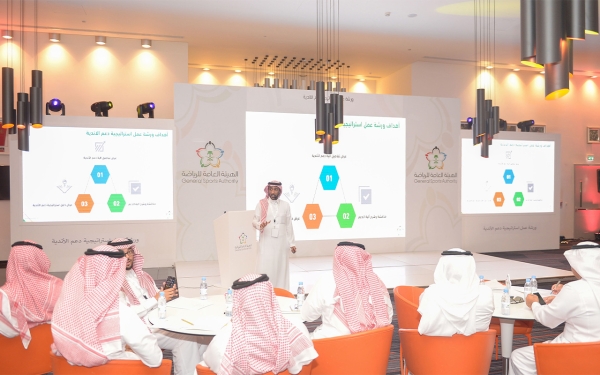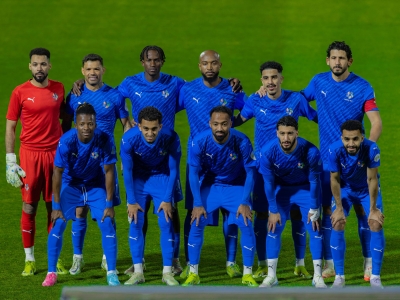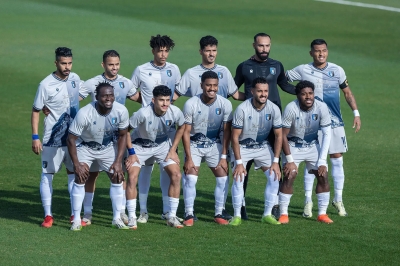
The Sports Club Support Strategy is a system that contributes to providing financial support for sports clubs in the Kingdom of Saudi Arabia. It regulates their financial structures and procedures, defining the financial efficiency criteria for these clubs. This strategy is defined as a program based on several pillars, aiming, among other things, to develop the financial and administrative system of the club, improve its facilities, encourage practitioners to engage in various sports in the club, and increase attendance rates.
It is one of the initiatives of the Ministry of Sport, which included workshops that lasted for two years. During these workshops, carefully planned strategic plans were developed with the aim of achieving sustainable development for sports clubs in the Kingdom. This was done according to a clear vision and methodology to build the future of sports, transforming it into an industry and investment that serves both athletes and the nation's sports sector alike.
Sports Club Support Strategy, which was launched in 2019, is one of the initiatives that opened wide horizons for sports in the Kingdom by applying the highest governance standards. The strategy aimed at developing clubs to ensure their financial, managerial, and operational sustainability. Moreover, it provided job opportunities that contributed to an increase in the overall performance evaluation across various sports, in addition to reflecting an improved experience for the sports audience.
Scope of the Sports Club Support Strategy
The Sports Club Support Strategy covers a number of aspects of developing the sports industry and encourages clubs to provide their financial resources. It also included the addition of five new sports: weightlifting, judo, badminton, gymnastics, and electronic games. These join the ten sports specified in the unified point system in the first year of the club support strategy. The deserved support is evaluated through the unified point system, with one hundred points for each sport, making the value of one point SAR320,000 available to about 170 clubs that meet the criteria of the strategy.
Funding sports activities according to the sports club support strategy
Sports clubs operate according to the Sports Club Support Strategy to provide funding for their various activities. As per the regulations, a club is a sports entity with legal personality and independent financial liability, or a company with legal personality and independent financial liability, licensed by the Ministry of Sport.
This definition is no different from the one used in the Regulation of Land Investment Allocated to Sports Clubs. The latter defines the club as a sporting authority with legal personality, supported financially and morally by the state in attaining its goals, in conformity with the laws of the International Olympic Committee, and continental and international federations.
Supporting club financing administratively and financially
The Sports Club Support Strategy provides support and funding to eligible sports clubs that meet the qualification criteria for initiatives included in the program. More than SAR2 billion have been allocated, and distributed on a monthly, quarterly, and annual basis, provided that each initiative meets its specific criteria and requirements.
Direct financial support for sports clubs
The Sports Club Support Strategy enhances the financial position of each eligible club, contributing to the development of their activities, enabling them to compete in more sports, and ensuring financial stability for the clubs.
Governance of sports clubs
Due to the successful implementation of the governance framework for clubs in the Roshn Saudi League and the first, second, third, and fourth divisions, the Club Rating System was launched for the first time during the 2022-2023 season. This was aimed at increasing the impact on the maturity level of the clubs. Clubs were classified into six categories (A, B, C, D, E, F) to allow participation for all sports clubs.
Development of the Sports Club Support Strategy
The Ministry of Sport continued to develop the Sports Club Support Strategy, announcing its continuation into its fifth year in 2023. The strategy aims to increase and sustain the financial and administrative sustainability of sports clubs in the Kingdom by implementing an effective governance system that contributes to their development and preserves their stability in the long term.
Several updates and modifications have been made to the strategy through six initiatives that cover various aspects, namely: direct support, governance, various sports, audience attendance, sports facilities development, and digital transformation.
The clubs were reclassified in the "Governance" initiative according to the administrative classification system for sports clubs, including all 171 clubs in the Kingdom, irrespective of their football league status. As for the "Various Sports" initiative, the federations were divided into categories, with those in Category (A) scoring a total of ninety-six points, those in Category (B) scoring a total of eighty-four points, and those in Category (C) scoring a total of sixty points.
The strategy in its fifth edition also allocated SAR30 million for the Public Attendance initiative, which is dedicated to clubs participating in the Prince Mohammed Bin Salman Professional League Cup. This funding is directed to the top five clubs with the highest average attendance at the end of the season.
The "Digital Transformation" initiative includes planned projects for implementation, which are: implementing an ERP system project, completing the governance assessment platform project, the different sports system (in parallel with existing systems), the sales system, the technical support ticket system for the ERP system, and the time tracking system.
Evaluation of clubs within the Sports Club Support Strategy
A specialized team continues the process of evaluating the clubs and verifying the fulfillment of the necessary criteria to qualify for support. Since the launch of the Sports Club Support Strategy in 2019, the initiative has successfully turned major challenges into tangible achievements. While sports clubs previously suffered from a lack of financial stability and weak financial resources, the clubs' revenues from sponsors increased to SAR328 million in the 2022-2023 season, up from SAR88 million in the 2019-2020 season. Moreover, 89 percent of the clubs in the pro league managed to obtain the financial competence certificate after the committee imposed regulations and laws to ensure sustainable and quality financial operations. This had a direct impact, evident through the decreased financial liabilities of the sports clubs.
According to the effective governance system in the strategy, the number of clubs that entered under the strategy and benefited from financial and quality administrative incentives increased from sixteen clubs in the 2019-2020 season to sixty-one clubs in the 2022-2023 season. Additionally, the number of employees in these clubs has risen to more than three thousand male and female staff members.
Privatization of clubs within the Sports Club Support Strategy
At the level of sports clubs' privatization in the Kingdom, the strategy achieved several accomplishments in this area. These include the announcement of the privatization of eight sports clubs. Al-Qadsiah FC's ownership was transferred to Aramco, al-Diriyah Club to the Diriyah Gate Development Authority, al-Ula FC to the Royal Commission for al-Ula, and al-Suqoor Club to the NEOM company. The ownership of the clubs: Al-Ittihad, al-Ahli, al-Nassr, and al-Hilal was transferred to the Public Investment Fund. An investment fund was established for each of these clubs, and their ownership was transferred, and the value of each club was deposited in the fund.
Achievements of the Sports Club Support Strategy
The strategy emphasized the development of the sports infrastructure in the Kingdom. Three sports facilities are undergoing comprehensive development, namely the facilities of al-Fateh, al-Ettifaq, and al-Shabab clubs. Additionally, nine sports facilities have been partially developed, meeting the highest local and international standards. These facilities belong to the clubs of al-Ittihad, al-Nassr, al-Hilal, al-Ahli, al-Qadsiah, al-Batin, al-Taawoun, Damac, and al-Raed.
The strategy also fostered a distinctive environment for sports fans' attendance. After focusing on improving the fan experience, the number of attendees increased from 1.1 million fans in the 2019-2020 season to 2.1 million fans in the 2022-2023 season, marking a 152 percent increase in the overall fan attendance rate.
Regarding the diversity in practicing various sports and games, the number of clubs activated for twelve sports reached 110 clubs in the 2022-2023 season. Consequently, the number of athletes increased from forty thousand in the 2019-2020 season to more than 81,000 in the 2022-2023 season. This growth followed the introduction of several new sports and the activation of women's participation in various activities and competitions.
The Financial Efficiency Committee
The Financial Efficiency Committee oversees the implementation of rules and standards for managing club spending, aiming to ensure clubs comply with specified guidelines that largely revolve around efficiently and effectively managing expenditure. It directs clubs to prioritize spending on player and coach salaries and encourages clubs to allocate the amounts due from the Different Sports Initiative to develop these sports within the club.
This committee consists of a team comprising an external financial auditor, a representative from the Saudi Arabian Football Federation, a representative from the Saudi Pro League Association, a legal affairs representative from the ministry, a financial affairs representative from the ministry, and a team from the Club Support Strategy.
Related quizzes
Related articles


